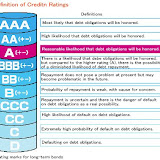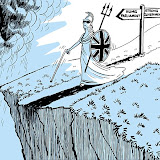The big three credit ratings agencies were threatened yesterday with fines and the creation of a new state-backed competitor, only weeks after European leaders attacked them for exacerbating Greece’s problems with downgrades. – The Times (UK) Readers will be familiar with...
Well Hung
posted by Jacques René Zammit
Why Cameron would love to be Maltese I cannot help wondering how David Cameron must wish that he was a Maltese politician. Rather than sitting at the negotiating table with that pesky Nick Clegg (the tiddler that he is) he’d be sitting firmly, decisively and stably at the head of some...
Hang On – UK e...
posted by Jacques René Zammit
It’s the last day before voting day and the three main parties in the UK have unleashed their last attempts to lure voters to their fold. Or should it be to scare voters away from their opponents’ fold? The Fear Factor, redolent of the Top Trumps Horror Series, has become a major...
Extracts for Change
posted by Jacques René Zammit
This Sunday’s Observer editorial is all about endorsing Nick Clegg as the candidate of change. There’s some interesting extracts that discuss subjects relevant to our local (Maltese) realities too: First there’s that echo of the argument of the “wasted vote”....


